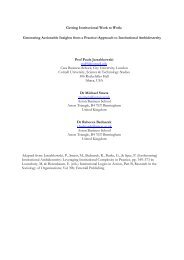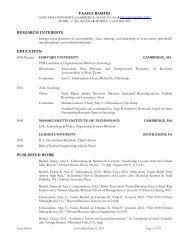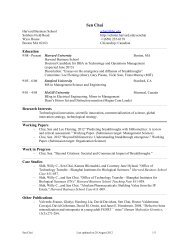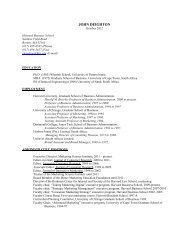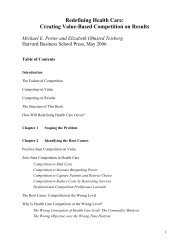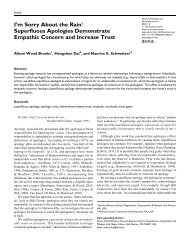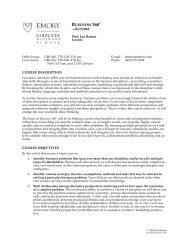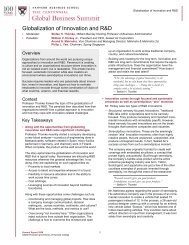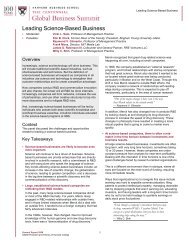- Page 1 and 2:
Guide to Business History Courses W
- Page 3 and 4:
Table of Contents 1. Introduction 2
- Page 5 and 6:
Guide to Business History Courses C
- Page 7 and 8:
oadly. 5 Many traditional business
- Page 9 and 10:
Index of Syllabi The following is a
- Page 11 and 12:
to the field of business history in
- Page 13 and 14:
Undergraduate lecture course highli
- Page 15 and 16:
their research papers. In January a
- Page 17 and 18:
Stevenson, Michael D. syllabus SB/M
- Page 19 and 20:
are, entrepreneurship actors are ju
- Page 21 and 22:
Fear, Jeff syllabus BUS 369-01: Ent
- Page 23 and 24:
systems…This course will analyze
- Page 25 and 26:
globalization and economic growth;
- Page 27 and 28:
―Should Business Be ‗Socially R
- Page 29 and 30:
students will encounter several dif
- Page 31 and 32:
Stern, Marc J. HIST 353: 20 th Cent
- Page 33 and 34:
This undergraduate lecture course a
- Page 35 and 36:
Levy, Jonathan syllabus HIST 379: T
- Page 37 and 38:
ECON-GB.2190.9W. Global Perspective
- Page 39 and 40:
part of the course explores the ris
- Page 41 and 42:
Wright, Robert E. & Pehl, Matthew s
- Page 43 and 44:
knowledge of the history of African
- Page 45 and 46:
Comparative History I (Graduate) Ab
- Page 47 and 48:
AUSTRALIA Australian National Unive
- Page 49 and 50:
Reckendrees, Alfred syllabus Busine
- Page 51 and 52:
[Economics and Business in Historic
- Page 53 and 54:
Schneider, Ute Unternehmensgeschich
- Page 55 and 56:
[Industrial Research between Busine
- Page 57 and 58:
Spoerer, Mark Unternehmensgeschicht
- Page 59 and 60:
This course closely tracks Geoffrey
- Page 61 and 62:
Company‖) is a basic first semest
- Page 63 and 64:
evolution or revolution for banking
- Page 65 and 66:
markets, their capacity for innovat
- Page 67 and 68:
The aim of the course is to analyse
- Page 69 and 70:
students to analyze a particular ca
- Page 71 and 72:
―This module examines corporate f
- Page 73 and 74:
This course aims ―To describe and
- Page 75 and 76:
XX, poniendo el énfasis en los con
- Page 77 and 78:
4. Rougier, Marcelo, ―Tribulacion
- Page 79 and 80:
Gutiérrez, Carlos, ―Atractivos y
- Page 81 and 82:
Para encuadrar el análisis y la di
- Page 83 and 84:
internacionalización temprana. Evo
- Page 85 and 86:
Artopoulos, Alejandro, ―Sociedad
- Page 87 and 88:
Barbero, María Inés (1997) ―Arg
- Page 89 and 90:
Gutiérrez, Carlos (2001) I&D, Apre
- Page 91 and 92:
Ostiguy, Pierre (1990) Los capitane
- Page 93 and 94:
ARGENTINA Universidad de San André
- Page 95 and 96:
Fernández, Paloma (2003), ―Reins
- Page 97 and 98:
ARGENTINA Universidad de San André
- Page 99 and 100:
IV. Contenidos Nota: La bibliograf
- Page 101 and 102:
Chandler, Alfred D. Jr. and Daems,
- Page 103 and 104:
ARGENTINA Universidad de San André
- Page 105 and 106:
The final module examines the creat
- Page 107 and 108:
CANADA (MB) - University of Winnipe
- Page 109 and 110:
Students will write a thesis-based
- Page 111 and 112:
24 Oct (Wed) 25 Oct (Thu) 26 Oct (F
- Page 113 and 114:
An executive‘s salary for working
- Page 115 and 116:
CANADA (MB) - University of Winnipe
- Page 117 and 118:
6 Apr. Review -- Research Paper due
- Page 119 and 120:
Tutorials Throughout term 10% Schol
- Page 121 and 122:
LECTURE SCHEDULE DATE TOPIC 6 Janua
- Page 123 and 124:
CANADA (ON) - Laurentian University
- Page 125 and 126:
If you need help with your assignme
- Page 127 and 128:
CANADA (ON) - Laurentian University
- Page 129 and 130:
Economies 12 January Alexander Hami
- Page 131 and 132:
35. What was the impact of the Conq
- Page 133 and 134:
H. Harriman, H.J. Heinz, James J. H
- Page 135 and 136:
***********************************
- Page 137 and 138:
Misfortunes of the World‘s Great
- Page 139 and 140:
CANADA (ON) - University of Western
- Page 141 and 142:
Oct. 20 Industrialization and consu
- Page 143 and 144:
B. Forster, ―Finding the Right Si
- Page 145 and 146:
show an ability to assess written h
- Page 147 and 148:
Reading : Taylor, Rise of Canadian
- Page 149 and 150:
CANADA (ON) - University of Western
- Page 151 and 152:
penalty of five percent the first d
- Page 153 and 154:
• Alexander Hamilton, ―Report o
- Page 155 and 156:
Lakehead University Orillia Campus
- Page 157 and 158:
the quantity and quality of contrib
- Page 159 and 160:
Required Reading Dimitry Anastakis,
- Page 161 and 162:
and by individually providing book
- Page 163 and 164:
Similar to Option 2, this type of p
- Page 165 and 166:
Week 3: September 24 From Jaywalkin
- Page 167 and 168:
Christopher Dummitt, ―A Crash Cou
- Page 169 and 170:
Week 11: November 26 Canada in the
- Page 171 and 172:
CANADA (ON) - Trent University; Pet
- Page 173 and 174:
Taylor, chapter 6 Donica Belisle,
- Page 175 and 176:
CANADA (ON) - Rotman School of Mana
- Page 177 and 178:
when groups are organized and topic
- Page 179 and 180:
Reading: Strong Managers, Weak Owne
- Page 181 and 182:
The overall thrust of the course wi
- Page 183 and 184:
- A graduate in history from the Un
- Page 185 and 186:
Part I - Laying the Foundations, Mi
- Page 187 and 188:
SESSION 10 - The Free Trade Agreeme
- Page 189 and 190:
Team Behaviours & Protocols All stu
- Page 191 and 192:
in Charles P. Kindleberger, ―Mani
- Page 193 and 194:
7. What strategy should Deutsche Ba
- Page 195 and 196:
Charles P. Kindleberger, ―Chapter
- Page 197 and 198:
6. Who are the stakeholders in the
- Page 199 and 200:
David A. Moss and Sarah Brennan,
- Page 201 and 202:
decision-making. Throughout the cou
- Page 203 and 204:
30%. These summaries should not exc
- Page 205 and 206:
Schedule of Topics and Readings The
- Page 207 and 208:
Session 5 (15 Oct 2012): The 19 th
- Page 209 and 210:
Required background reading: *S. J.
- Page 211 and 212:
CANADA (ON) - Schulich School of Bu
- Page 213 and 214:
The course grading scheme for Maste
- Page 215 and 216:
*Pankaj Ghemawat, ―Distance Still
- Page 217 and 218:
Assigned Work Due: Case Write-up Se
- Page 219 and 220:
Assigned Work Due: Case Write-up We
- Page 221 and 222:
perspective and use historical expe
- Page 223 and 224:
Moisés Naím, ―Globalization‖,
- Page 225 and 226:
Week 10 (22 November)—Professiona
- Page 227 and 228:
Assigned Reading Required reading f
- Page 229 and 230:
members and the instructor during t
- Page 231 and 232:
Group Presentation Case Study #3—
- Page 233 and 234:
CANADA (ON) - St. Jerome‘s Univer
- Page 235 and 236:
Reading: Marilyn Gerriets & Julian
- Page 237 and 238:
39. March 27 Business in the Era of
- Page 239 and 240:
238
- Page 241 and 242:
in an early state of development; i
- Page 243 and 244:
Methodology The course follows the
- Page 245 and 246:
Davidsson, P., Low, M. B & Wrigh, M
- Page 247 and 248:
Cooper, A. (2005). Entrepreneurship
- Page 249 and 250:
� Zahra, S. &. Dess, G. G. (2001)
- Page 251 and 252:
Class 6 September 2, 2011 The entre
- Page 253 and 254:
Schutz, S. P. (1971)/[1965]. N-achi
- Page 255 and 256:
Fajardo, L. H. (1975). Valores, men
- Page 257 and 258:
Grondona, M. (2000). A cultural typ
- Page 259 and 260:
Class 13 November 1, 2011 Entrepren
- Page 261 and 262:
and entrepreneurs in Spain, 1997-20
- Page 263 and 264:
COLOMBIA Universidad de los Andes;
- Page 265 and 266:
• Understand the evolution, role
- Page 267 and 268:
Friday Oct. 28 1 p.m. - 5 p.m. Satu
- Page 269 and 270:
Saturday Nov. 26 1 p.m. - 5 p.m. 7
- Page 271 and 272:
2. Familiarize students with basic
- Page 273 and 274:
Evaluation � Periodic quicces �
- Page 275 and 276:
February 21 10. Thursday February 2
- Page 277 and 278:
22. Thursday April 12 23. Tuesday A
- Page 279 and 280:
UNITED STATES (DC) - The George Was
- Page 281 and 282:
9/19 Origins of Industrialization (
- Page 283 and 284:
UNITED STATES (CA) - Claremont Mcke
- Page 285 and 286:
* Carnegie, ―Gospel of Wealth‖
- Page 287 and 288:
Week 8: March 8 th & 10 th , Mid-ce
- Page 289 and 290:
UNITED STATES (CA) - University of
- Page 291 and 292:
Didion, from Where I Was From (BB)
- Page 293 and 294:
lectures. Some context and backgrou
- Page 295 and 296:
All papers should have titles, and
- Page 297 and 298:
7 2/21 2/23 2/24 8 2/28 3/1 3/2 9 3
- Page 299 and 300:
Information you should note about e
- Page 301 and 302:
4) Analyzing how companies have ent
- Page 303 and 304:
The Economist The New York Times Wa
- Page 305 and 306:
it. These presentations should util
- Page 307 and 308:
1) Michael Porter, Jorge Ramirez-Va
- Page 309 and 310:
UNITED STATES (CA) - University of
- Page 311 and 312:
Christopher A. Bartlett and Ashish
- Page 313 and 314:
eader into a particular strategic s
- Page 315 and 316:
10/29: Danish Beer 1) Carlsberg in
- Page 317 and 318:
UNITED STATES (CA) - University of
- Page 319 and 320:
Aside from those listed below, on a
- Page 321 and 322:
over time, its relations to the oth
- Page 323 and 324:
2) *Geoffrey Jones and Peter Miskel
- Page 325 and 326:
UNITED STATES (CA) - University of
- Page 327 and 328:
page reflection on the main themes
- Page 329 and 330:
1) (Reading Response Due!) Wolfgang
- Page 331 and 332:
ecome familiar with different inter
- Page 333 and 334:
10/21: Origins of Government Regula
- Page 335 and 336:
Paper #1: Research and write a busi
- Page 337 and 338:
3. Case Studies and excerpted readi
- Page 339 and 340:
UNITED STATES (CO) - University of
- Page 341 and 342:
Nov. 9 Ore; S&C 11; Carson 9. Oppos
- Page 343 and 344:
TERM PROJECT The term project will
- Page 345 and 346:
UNITED STATES (CT) - Yale Universit
- Page 347 and 348:
Steven W. Usselman, ―Patents Purl
- Page 349 and 350:
Feel free to email me if you have a
- Page 351 and 352:
one for their children. Altogether,
- Page 353 and 354:
UNITED STATES (FL) - University of
- Page 355 and 356:
Readings: Adam Smith, An Inquiry in
- Page 357 and 358:
Readings: Ray Stannard Baker, ―Th
- Page 359 and 360:
December 2 The Future of the Americ
- Page 361 and 362:
this class, any absences above one
- Page 363 and 364:
September 28 Slavery and American C
- Page 365 and 366:
Louis D. Brandeis; James M. Landis;
- Page 367 and 368:
UNITED STATES (FL) - Florida Intern
- Page 369 and 370:
Class 5: People and the Machine Rea
- Page 371 and 372:
ISBN: 978-0674940529 Publisher: Bel
- Page 373 and 374:
UNITED STATES (FL) - Florida Intern
- Page 375 and 376:
Reading: ―The Apologia of Robert
- Page 377 and 378:
UNITED STATES (FL) - Florida Intern
- Page 379 and 380:
Jan 31: Trade and Exchange Readings
- Page 381 and 382:
April 11: Capitalism and globalizat
- Page 383 and 384:
operation of firms in China include
- Page 385 and 386:
Classroom behavior: There are sever
- Page 387 and 388:
Changhong Pei and Lei Peng, ―Resp
- Page 389 and 390:
Questions Week 10 9 and 11 How Chin
- Page 391 and 392:
UNITED STATES (GA) - University of
- Page 393 and 394:
Week 1: Crash Course in Capitalism
- Page 395 and 396:
Week 14: Class, Culture, and Capita
- Page 397 and 398:
Georgia Bookstore across from the T
- Page 399 and 400:
and Massachusetts Farmers, 1750-185
- Page 401 and 402:
March 4: Capitalism and Anti-Slaver
- Page 403 and 404:
Women in the Corporate Office, 1870
- Page 405 and 406:
- should not take the class, either
- Page 407 and 408:
Documentary History, 87-98. Septemb
- Page 409 and 410:
UNITED STATES (GA) - Georgia Instit
- Page 411 and 412:
Colbert Rhodes and John Butler, (20
- Page 413 and 414:
3 Boston, Thomas. ―High-Growth Bl
- Page 415 and 416:
River, New Jersey: Pearson Educatio
- Page 417 and 418:
viability. One objective of the cou
- Page 419 and 420:
UNITED STATES (GA) - Georgia Instit
- Page 421 and 422:
Paul Starr, _The Creation of the Me
- Page 423 and 424:
Common Readings: Gavin Wright, ―O
- Page 425 and 426:
Gary Libecap on property rights and
- Page 427 and 428:
Group C (government research). Repo
- Page 429 and 430:
Usselman on IBM in Challenge of Rem
- Page 431 and 432:
UNITED STATES (GA) - Georgia Instit
- Page 433 and 434:
Office Hours and Communications In
- Page 435 and 436:
W 12/5 - F 12/7 Catch-Up and Review
- Page 437 and 438:
I keep office hours as noted above.
- Page 439 and 440:
UNITED STATES (GA) - Georgia Instit
- Page 441 and 442:
3085‖ in the subject line of your
- Page 443 and 444:
UNITED STATES (IL) - Southern Illin
- Page 445 and 446:
Week 11 Business Success during the
- Page 447 and 448:
Chain Store Menace‖ E-reserve:
- Page 449 and 450:
The list of ―business films‖ ru
- Page 451 and 452:
Biographical references Business le
- Page 453 and 454:
d. Footnoting: Direct quotations mu
- Page 455 and 456:
UNITED STATES (IL) - University of
- Page 457 and 458:
January 26 Reading: Geoffrey Jones,
- Page 459 and 460:
UNITED STATES (MA) - Harvard Busine
- Page 461 and 462:
Andrea Colli and Mary Rose, ―Fami
- Page 463 and 464:
Sharon Ann Murphy, ―Selecting Ris
- Page 465 and 466:
eviewing the historical evidence on
- Page 467 and 468:
Class #2 Thursday, September 8, 10:
- Page 469 and 470:
understand why Argentina was such a
- Page 471 and 472:
dollars to governments in Europe, L
- Page 473 and 474:
2.Why did Daniel Guggenheim believe
- Page 475 and 476:
Materials The Octopus and the Gener
- Page 477 and 478:
Aristotle Onassis and the Greek Shi
- Page 479 and 480:
as a vehicle to explain why diversi
- Page 481 and 482:
in the 1960s to attract them to dev
- Page 483 and 484:
Class #25 Wednesday, November 30, 1
- Page 485 and 486:
Kaweyan: Female Entrepreneurship an
- Page 487 and 488:
Supplement 1: In Their Time (HBP bo
- Page 489 and 490:
labor organizing movement impacted
- Page 491 and 492:
UNITED STATES (MA) - Harvard Busine
- Page 493 and 494:
CLASS #16: Fannie Mae: Public or Pr
- Page 495 and 496:
1. What are the biggest challenges
- Page 497 and 498:
note issued by a New York bank be f
- Page 499 and 500:
3. Why did the Great Depression foo
- Page 501 and 502:
headquarters of the Deutsche Bank a
- Page 503 and 504:
1. Should Prime Minister Hawke adop
- Page 505 and 506:
CLASS #21 Tuesday, April 3, 11:40am
- Page 507 and 508:
� Adam Rothman, Slave Country: Am
- Page 509 and 510:
February 24: The Rise of King Cotto
- Page 511 and 512:
� C. Wright Mills, ―Introductio
- Page 513 and 514:
UNITED STATES (MA) - Harvard Univer
- Page 515 and 516:
Robert S. Duplessis, Transitions to
- Page 517 and 518:
in Nineteenth-Century Europe, ed. J
- Page 519 and 520:
http://www.youtube.com/watch?v=qOP2
- Page 521 and 522:
Increasingly, historically oriented
- Page 523 and 524:
Mon., Oct. 18: Perry Mehrling, Barn
- Page 525 and 526:
UNITED STATES (MA) - Harvard Univer
- Page 527 and 528:
Part II - Europe and an ―Internat
- Page 529 and 530:
Reading: Barry Eichengreen, Globali
- Page 531 and 532:
UNITED STATES (MA) - Harvard Univer
- Page 533 and 534:
from the Austrian Empire to India
- Page 535 and 536:
Norton. Paulson, Henry M. Jr. (2010
- Page 537 and 538:
Credit Channel of Monetary Policy T
- Page 539 and 540:
Solomon, Deborah and Hilsenrath, Jo
- Page 541 and 542:
Becker-Posner Blog, December 14, 20
- Page 543 and 544:
Test,‖ given at the Marcus-Evans
- Page 545 and 546:
Liberal, January 19, 2009. Johnson,
- Page 547 and 548:
There will also be presentations an
- Page 549 and 550:
1/24 Introduction Introduction to C
- Page 551 and 552:
UNITED STATES (MD) - Univ. of Maryl
- Page 553 and 554:
Read Juliet E.K. Walker, ―Black E
- Page 555 and 556:
Week 11 March 27 Student Meetings o
- Page 557 and 558:
Make-up Exams and Late Papers. If f
- Page 559 and 560:
UNITED STATES (MD) - University of
- Page 561 and 562:
Subhi Labib, ―Capitalism in Medie
- Page 563 and 564:
www.marxists.org/archive/marx/works
- Page 565 and 566:
Herbert Stein, Presidential Economi
- Page 567 and 568:
Required readings: Frederic von Hay
- Page 569 and 570:
eading before class meetings; bring
- Page 571 and 572:
10/8: A Legal Regime for Developmen
- Page 573 and 574:
UNITED STATES (MD) - University of
- Page 575 and 576:
Kenneth Lipartito, ―Culture and t
- Page 577 and 578:
William G. Roy, Socializing Capital
- Page 579 and 580:
*David B. Sicilia, ―The Corporati
- Page 581 and 582:
Class participation. Classroom disc
- Page 583 and 584:
9/25: Regulating Trusts Henry Demar
- Page 585 and 586:
UNITED STATES (NC) - University of
- Page 587 and 588:
The Jefferson-Hamilton Debate Readi
- Page 589 and 590:
Monday, April 9 Regulation and Dere
- Page 591 and 592:
Week 1: January 10—Introduction t
- Page 593 and 594:
William Leuchtenberg, Franklin D. R
- Page 595 and 596:
used to check attendance and partic
- Page 597 and 598:
March 26-28 The case of electronics
- Page 599 and 600:
COURSE REQUIREMENTS This ―Writing
- Page 601 and 602:
Please look over the ―Guide to Re
- Page 603 and 604:
Oct. 9-12 Fall Break II. INNOVATION
- Page 605 and 606:
Michael Shanks, ―Tapping the Risi
- Page 607 and 608:
Paul Street, ―The Swift Differenc
- Page 609 and 610:
UNITED STATES (NC) - Duke Universit
- Page 611 and 612:
it over time from its inception to
- Page 613 and 614:
―China Silk in Europe in the Yuan
- Page 615 and 616:
Economic History 57:1 (March 1997):
- Page 617 and 618:
Friday Discussion: ―One Hundred Y
- Page 619 and 620:
UNITED STATES (NC) - Wake Forest Un
- Page 621 and 622:
UNITED STATES (NJ) - Rutgers Busine
- Page 623 and 624:
Class topics 1. The history of glob
- Page 625 and 626:
excursion‖, chapter 5 in Multinat
- Page 627 and 628:
European Review of Economic History
- Page 629 and 630:
Paper Title: Discuss the significan
- Page 631 and 632:
UNITED STATES (NJ) - Princeton Univ
- Page 633 and 634:
Week 4 (Oct. 7): The Captains of In
- Page 635 and 636:
UNITED STATES (NJ) - Princeton Univ
- Page 637 and 638:
6) Proprietors ofCharles River Brid
- Page 639 and 640:
Week 10: The Golden Age? Tues., Nov
- Page 641 and 642:
UNITED STATES (NY) - University at
- Page 643 and 644:
Andrew Carnegie, ―Introduction: H
- Page 645 and 646:
Week 13. April 27, 29. Reading: Rei
- Page 647 and 648:
W Jan.: 19 Introduction 1. The prob
- Page 649 and 650:
Spring Break March 14-18 8. The Cap
- Page 651 and 652:
UNITED STATES (NY) - Columbia Unive
- Page 653 and 654:
Readings: Zakim and Kornblith, Capi
- Page 655 and 656:
UNITED STATES (NY) - Columbia Unive
- Page 657 and 658:
Week 7: 6 October: Big Business bef
- Page 659 and 660:
manipulate and monopolize the natio
- Page 661 and 662:
Class participation: 20% Class lead
- Page 663 and 664:
November 2: The Culture of Wall Str
- Page 665 and 666:
UNITED STATES (NY) - The New School
- Page 667 and 668:
Each student will prepare two book
- Page 669 and 670:
*Woody Holton, ―Abigail Adams: Bo
- Page 671 and 672:
Karen Ho, ―Wall Street Historiogr
- Page 673 and 674:
Jonathon White, Director of Academi
- Page 675 and 676:
UNITED STATES (NY) - Stern School o
- Page 677 and 678:
Session 2, May 24th. The Early Repu
- Page 679 and 680:
UNITED STATES (NY) - Stern School o
- Page 681 and 682:
ECON-GB.2190.9W Global Perspectives
- Page 683 and 684:
UNITED STATES (NY) - Stern School o
- Page 685 and 686:
Read: ―Saudi Arabia‖ and ―Gaz
- Page 687 and 688:
UNITED STATES (NY) - Stern School o
- Page 689 and 690:
precocious banking, securities-mark
- Page 691 and 692:
A. Creating the American financial
- Page 693 and 694:
Hetzel, Chaps. 4-6 Sylla, ―United
- Page 695 and 696:
UNITED STATES (NY) - Hartwick Colle
- Page 697 and 698:
Week 2: Sept. 14-16 Tues. Social Ca
- Page 699 and 700:
Tues. Advertising Industry: Early B
- Page 701 and 702:
Documentaries: (viewed inside class
- Page 703 and 704:
Discuss ads from Emergence of Adver
- Page 705 and 706:
UNITED STATES (OH) - Ohio State Uni
- Page 707 and 708:
The novel by Horatio Alger is a pri
- Page 709 and 710:
Students with disabilities that hav
- Page 711 and 712:
From Hoover to Roosevelt: The Mixed
- Page 713 and 714:
Books: I‘ve ordered the following
- Page 715 and 716:
May 29: SHORT PAPER DUE: The World
- Page 717 and 718:
economies represent quite different
- Page 719 and 720:
JR Hollingsworth, P. Schmitter and
- Page 721 and 722:
Elizabeth Saunders. 1986. ―Indust
- Page 723 and 724:
UNITED STATES (OR) - Reed College;
- Page 725 and 726:
Marc Schneiberg and Timothy Bartley
- Page 727 and 728:
Week 12: Monday November 23 Regulat
- Page 729 and 730:
Robert R. Locke and J.-C. Spender,
- Page 731 and 732:
o In American manufacturing and inf
- Page 733 and 734:
every part embodies the spirit of t
- Page 735 and 736:
Joseph E. Stiglitz, Freefall: Ameri
- Page 737 and 738:
� Objective o Trace the developme
- Page 739 and 740:
o Document major developments in ba
- Page 741 and 742:
New Deal Economic Policy (April 7)
- Page 743 and 744:
March 17: The Rise of the Large-Sca
- Page 745 and 746:
UNITED STATES (RI) - Brown Universi
- Page 747 and 748:
February 22: Enlightenment Politica
- Page 749 and 750:
� Barry Eichengreen, ―The Brett
- Page 751 and 752:
Readings All readings for this cour
- Page 753 and 754:
Monday September 10: America in the
- Page 755 and 756:
Friday October 19: Regulating the M
- Page 757 and 758:
The purpose of this assignment is t
- Page 759 and 760:
Due date (final draft, submit hard
- Page 761 and 762:
emotional appeal; and sometimes a s
- Page 763 and 764:
1. In preparing, work backwards. De
- Page 765 and 766:
� Think about what intermediate s
- Page 767 and 768:
Specifically, which side, capital o
- Page 769 and 770:
Week 10: The Dynamite Plot Reading:
- Page 771 and 772:
UNITED STATES (SD) - Augustana Coll
- Page 773 and 774:
Friday, 7 January: The Internationa
- Page 775 and 776:
ubbles or bailouts) in detail. It m
- Page 777 and 778:
Acemoglu, Daron and James A. Robins
- Page 779 and 780:
Reading due: Familiarize yourself w
- Page 781 and 782:
UNITED STATES (SD) - Augustana Coll
- Page 783 and 784:
Tuesday, 21 February: Entrepreneurs
- Page 785 and 786:
DO: Attend class and be prepared to
- Page 787 and 788:
UNITED STATES (TN) - Vanderbilt Uni
- Page 789 and 790:
8 9 10 11 12 Southern Business--The
- Page 791 and 792:
2009). Richard Powers, Gain: A Nove
- Page 793 and 794:
5 9/25 Labor and Industrialization:
- Page 795 and 796:
Course Requirements/Instructions: 1
- Page 797 and 798:
12. Books are available on PCL rese
- Page 799 and 800:
27. Inspired by the Texas Higher Ed
- Page 801 and 802:
of Corporate Intellectual Property,
- Page 803 and 804:
permitted to submit papers as email
- Page 805 and 806:
UNITED STATES (TX) - University of
- Page 807 and 808:
10 10/31 Management Decisions Max B
- Page 809 and 810:
can criticize the author‘s argume
- Page 811 and 812:
13) Late papers will be penalized a
- Page 813 and 814:
UNITED STATES (TX) - University of
- Page 815 and 816:
Does the increasing success of supe
- Page 817 and 818:
Rhoden, William, Forty Million Doll
- Page 819 and 820:
the Transformation of American Cult
- Page 821 and 822:
UNITED STATES (TX) - University of
- Page 823 and 824:
expected to conduct themselves appr
- Page 825 and 826:
2. City of Richmond v. J. A. Croson
- Page 827 and 828:
JAN. 26 (TH) LECTURE - THINKING ABO
- Page 829 and 830:
FEB. 29 - MARCH 1 (W‐TH) DISCUSSI
- Page 831 and 832:
MARCH 29 (TH) LECTURE - ―WORLD WA
- Page 833 and 834:
London: MIT Press, 1999), 37‐88 (
- Page 835 and 836:
―Participation,‖ which will cou
- Page 837 and 838:
Northeast.‖ Journal of American H
- Page 839 and 840:
o Julia Ott, When Wall Street Met M
- Page 841 and 842:
AUSTRALIA Australian National Unive
- Page 843 and 844:
This course also uses the ANU‘s W
- Page 845 and 846:
AUSTRALIA Australian National Unive
- Page 847 and 848:
. Tutorial issue presentation c. an
- Page 849 and 850:
Maximum Length 30 multiple choice q
- Page 851 and 852:
6. Tutorial program Organisation Yo
- Page 853 and 854:
that many Japanese companies use. (
- Page 855 and 856:
Chang Chun-Yen and Yu Po-Lung (2001
- Page 857 and 858:
ANU library website (click ‗Onlin
- Page 859 and 860:
Room: tba Consultation Times: tba R
- Page 861 and 862:
.......13 Retention................
- Page 863 and 864:
more complex ideas. The lectures al
- Page 865 and 866:
There is a rapidly growing volume o
- Page 867 and 868:
Tutorial Times Will be held on : In
- Page 869 and 870:
EUROPE DENMARK Copenhagen Business
- Page 871 and 872:
Course readings (subject to change)
- Page 873 and 874:
Minsky, Hyman, ―A Theory of Syste
- Page 875 and 876:
Johnson, ―The Quiet Coup‖ Strau
- Page 877 and 878:
DENMARK Copenhagen Business School;
- Page 879 and 880:
Anheier, Helmut K & Lynne Moulton,
- Page 881 and 882:
Readings: Kindleberger & Aliber, Ma
- Page 883 and 884:
Krugmann, Paul (2008), The Return o
- Page 885 and 886:
Content: The course gives insight i
- Page 887 and 888:
Week 38: Session 5 Monday, 17th Sep
- Page 889 and 890:
Freeman & Louca: Technical Change a
- Page 891 and 892:
FRANCE Université du Littoral Côt
- Page 893 and 894:
� l'histoire sociale et celle des
- Page 895 and 896:
ENTRE MONDIALISATION ET RÉGIONALIS
- Page 897 and 898:
Georges Vigarello, Histoire de la b
- Page 899 and 900:
UE 5 Managing innovation (5ects, 42
- Page 901 and 902:
The students are part of the progra
- Page 903 and 904:
- Sophisticated organizations (―M
- Page 905 and 906:
- Handling of questions - Managing
- Page 907 and 908:
Time Magazine, Monday, Mar. 08, 192
- Page 909 and 910:
ITALY (BO) Università di Bologna;
- Page 911 and 912:
ITALY (FI) European University Inst
- Page 913 and 914:
• Gourevitch, Peter (1986) Politi
- Page 915 and 916:
ITALY (FI) European University Inst
- Page 917 and 918:
Week 6. Citizenship, Individual Rig
- Page 919 and 920:
918
- Page 921 and 922:
Borruso 1 13/02/ 12 Una fotografia
- Page 923 and 924:
ITALY (MI) Università Commerciale
- Page 925 and 926:
ITALY (MI) Università Commerciale
- Page 927 and 928:
ITALY (MI) Università Commerciale
- Page 929 and 930:
# Date Topic Students‘ reading Te
- Page 931 and 932:
ITALY (MI) Università Commerciale
- Page 933 and 934:
10 What is good governance? 11 Corp
- Page 935 and 936:
Readings … Exam The final grade w
- Page 937 and 938:
ITALY (VE) Ca' Foscari University o
- Page 939 and 940:
2 nd Part: Entrepreneurship & Organ
- Page 941 and 942:
NETHERLANDS Erasmus Universiteit Ro
- Page 943 and 944:
5 York 2003) + video 11 October 201
- Page 945 and 946:
Each week two or three students wil
- Page 947 and 948:
IV. Written examinations (average o
- Page 949 and 950:
Secretary: Education Office ESHCC C
- Page 951 and 952:
Since the 1960s a new and scientifi
- Page 953 and 954:
6. Assessment The final grade for t
- Page 955 and 956:
Literature: - To learn the theory o
- Page 957 and 958:
Literature: � To learn about the
- Page 959 and 960:
Assignment: Write a short paper/ess
- Page 961 and 962:
Shleifer, Andrei; Vishny, Robert W.
- Page 963 and 964:
Introduction The firm Ltd. The firm
- Page 965 and 966:
NORWAY Handelshøyskolen BI [BI Nor
- Page 967 and 968:
NORWAY Handelshøyskolen BI [BI Nor
- Page 969 and 970:
I. Topics from applied financial ec
- Page 971 and 972:
Regimes from Laissez-Faire to Globa
- Page 973 and 974:
SPAIN Universitat de Barcelona; Bar
- Page 975 and 976:
SPAIN Universitat Pompeu Fabra; Bar
- Page 977 and 978:
976
- Page 979 and 980:
978
- Page 981 and 982:
980
- Page 983 and 984:
982
- Page 985 and 986:
984
- Page 987 and 988:
986
- Page 989 and 990:
988
- Page 991 and 992:
990
- Page 993 and 994:
SPAIN Universitat Pompeu Fabra; Bar
- Page 995 and 996:
5. Evaluation Evaluation of the sub
- Page 997 and 998:
Teaching resources: Veronica Binda,
- Page 999 and 1000:
8. Schedule of activities Week Clas
- Page 1001 and 1002:
Las clases se articulan en torno a
- Page 1003 and 1004:
cuestiones teóricas como práctica
- Page 1005 and 1006:
5. Cronograma* / Course calendar *E
- Page 1007 and 1008:
Horarío de tutorías: A disposici
- Page 1009 and 1010:
-BROADBERRY, S. and O‘ROURKE, K.H
- Page 1011 and 1012:
evaluación continua y el examen fi
- Page 1013 and 1014:
SPAIN Universidad Autónoma de Madr
- Page 1015 and 1016:
4. El retroceso de la globalizació
- Page 1017 and 1018:
- Análisis de tablas estadísticas
- Page 1019 and 1020:
SPAIN Universidad de Salamanca; Sal
- Page 1021 and 1022:
PART IV. Globalisation: challenges
- Page 1023 and 1024:
conjunto de los estudiantes. La asi
- Page 1025 and 1026:
avanzada. � CG4: Compromiso étic
- Page 1027 and 1028:
Tema 4.- La influencia de las econo
- Page 1029 and 1030:
VALDALISO, J. M. (2005): ―El esp
- Page 1031 and 1032:
different forms of taxation, regula
- Page 1033 and 1034:
macroeconomic data, particularly fo
- Page 1035 and 1036:
Tuesday 22/11 9-11 LECTURE Room: CG
- Page 1037 and 1038:
Albinsson, Staffan: ―More Rhetori
- Page 1039 and 1040:
SWITZERLAND Université de Genève;
- Page 1041 and 1042:
7. L'acier 19 avril 2012 Bernard El
- Page 1043 and 1044:
Validation de l'enseignement (3 cr
- Page 1045 and 1046:
BUSINESS HISTORY REVIEW, 85, 4, PP.
- Page 1047 and 1048:
Week 5: Models of business in contr
- Page 1049 and 1050:
• Williamson, O. E. (1979). ―Tr
- Page 1051 and 1052:
UNITED KINGDOM (ENG) - Lancaster Un
- Page 1053 and 1054:
Ossie Jones and Fiona Tulley Compet
- Page 1055 and 1056:
TEACHING AND LEARNING STRATEGIES Le
- Page 1057 and 1058:
9th October The Global Economy in t
- Page 1059 and 1060:
CORE READING VITAL. However, you sh
- Page 1061 and 1062:
Chandler, Alfred D. (1992), ‗Orga
- Page 1063 and 1064:
Pauly, Lewis W. & Reich, Simon (199
- Page 1065 and 1066:
Farrell, Diana et al. (2004), ‗Ch
- Page 1067 and 1068:
Konings, M. (2008), ‗The Institut
- Page 1069 and 1070:
working papers. Links to company we
- Page 1071 and 1072:
M Dintenfass, The Decline of Indust
- Page 1073 and 1074:
1. What have been the aims of natio
- Page 1075 and 1076:
Geoffrey Jones, Multinationals and
- Page 1077 and 1078:
Chandler and beyond: how business h
- Page 1079 and 1080:
Barrell, Ray; Mason, Geoff and O'Ma
- Page 1081 and 1082:
UNITED KINGDOM (ENG) - London Schoo
- Page 1083 and 1084:
• Discuss the strategies of four
- Page 1085 and 1086:
UNITED KINGDOM (ENG) - Oxford Brook
- Page 1087 and 1088:
Content The key elements of this mo
- Page 1089 and 1090:
� Wilson J F (1995) British Busin
- Page 1091 and 1092:
Seminar tasks Discussion of issues
- Page 1093 and 1094:
Yip,G.S., Loewe,P M., Yoshino,M. Y.
- Page 1095 and 1096:
UNITED KINGDOM (ENG) - Said Busines
- Page 1097 and 1098:
Varieties of Capitalism & Corporate
- Page 1099 and 1100:
Management Journal, 7 (1) pp.10-22.
- Page 1101 and 1102:
Article available on Business Sourc
- Page 1103 and 1104:
Tutorial topic Choose a product you
- Page 1105 and 1106:
Levitt, T. (Sept-Oct 1975) ‗Marke
- Page 1107 and 1108:
Europe (1993), D.J. Hickson (ed), E
- Page 1109 and 1110:
*G. Currie, D. Knights and K. Stark
- Page 1111 and 1112:
R. Shimizu and Y, Higuchi ‗The Va
- Page 1113 and 1114:
M.L. Blim, Made in Italy: Small Sca
- Page 1115 and 1116:
9. 1) Why has investment in human r
- Page 1117 and 1118:
Reading Almost all the books and jo
- Page 1119 and 1120:
P. J. Buckley and M. Casson, ‗A T
- Page 1121 and 1122:
G. Jones and T. Khanna, ‗Bringing
- Page 1123 and 1124:
Suma Athreye and Andrew Godley, ‗
- Page 1125 and 1126:
C. Miller, S. McIntyre and M. Mantr
- Page 1127 and 1128:
Bud, Robert (2007), Penicillin: Tri
- Page 1129 and 1130:
Tutorial times and locations are: G
- Page 1131 and 1132:
Shane, Scott Andrew, A general theo
- Page 1133 and 1134:
Tyebjee, Tyzoon Albert V. Bruno, an
- Page 1135 and 1136:
Basu, A. ‗Family and business: A
- Page 1137 and 1138:
UNITED KINGDOM (ENG) - Henley Busin
- Page 1139 and 1140:
These two lectures examine various
- Page 1141 and 1142:
UNITED KINGDOM (ENG) - Henley Busin
- Page 1143 and 1144:
Broadberry, S. and Gupta, B. (2006)
- Page 1145 and 1146:
Joel Mokyr, `Why ―More work for m
- Page 1147 and 1148:
Amrita Narlikar, The World Trade Or
- Page 1149 and 1150:
School for Business and Management
- Page 1151 and 1152:
necessary when on-campus. Let Eilis
- Page 1153 and 1154:
(available electronically) Week 2 S
- Page 1155 and 1156:
Europe and the US? 3. What strategi
- Page 1157 and 1158:
MATERIALS: ‗Making China Beautifu
- Page 1159 and 1160:
UNITED KINGDOM (N. Ireland) - Queen
- Page 1161 and 1162:
Blog: Students are expected to sign
- Page 1163 and 1164:
Adams, R. B., Hermalin, B. E. and W
- Page 1165 and 1166:
La Porta, R., Lopez-De-Silanes, F.,
- Page 1167 and 1168:
*Skinner, D. J. (2008), ―The Evol
- Page 1169 and 1170:
6. Results and Analysis section (ap
- Page 1171 and 1172:
UNITED KINGDOM (Scotland) - Univers
- Page 1173 and 1174: Structure of the Programme The Msc
- Page 1175 and 1176: Enjoy! We hope you enjoy the progra
- Page 1177 and 1178: Method: The course will be taught b
- Page 1179 and 1180: Group B M.J. Enright, Successful Mu
- Page 1181 and 1182: � Identify the key features of th
- Page 1183 and 1184: UNITED KINGDOM (Scotland) - Univers
- Page 1185 and 1186: C Bramall, Chinese Economic Develop
- Page 1187 and 1188: NR Lardy, Foreign trade and economi
- Page 1189 and 1190: H Gao and D Lewis eds., China's par
- Page 1191 and 1192: UNITED KINGDOM (Scotland) - Univers
- Page 1193 and 1194: 5 Accurate information, which avoid
- Page 1195 and 1196: CR Schenk, ‗Sterling, Internation
- Page 1197 and 1198: Barry Eichengreen, ‗From Benign N
- Page 1199 and 1200: EA Brett, The World Economy Since t
- Page 1201 and 1202: Document 208. Memorandum From Secre
- Page 1203 and 1204: an absence of more than seven conse
- Page 1205 and 1206: Another Germany: A Reconsideration
- Page 1207 and 1208: Seminar 2: What were the key featur
- Page 1209 and 1210: Seminar 5: How did the ―crisis of
- Page 1211 and 1212: Takashi Nishiyama, ―Cross-discipl
- Page 1213 and 1214: shorter than 2,500 words and no lon
- Page 1215 and 1216: UNITED KINGDOM (Scotland) - Univers
- Page 1217 and 1218: ―The Historical Roots of Globaliz
- Page 1219 and 1220: Why do firms decide to establish su
- Page 1221 and 1222: Pavlos Dimitratos, et. al., ―The
- Page 1223: UNITED KINGDOM (Scotland) - Univers
- Page 1227 and 1228: 5 November Big business, WW II and
- Page 1229 and 1230: Elaine Glovka Spencer, Management a
- Page 1231 and 1232: Gregor, Daimler-Benz in the Third R
- Page 1233 and 1234: Tolliday, ―Enterprise and the Sta
- Page 1235 and 1236: ead a minimum of one document and t
- Page 1237 and 1238: Karl Hardach. The Political Economy
- Page 1239 and 1240: 4. Enter the data and produce the t
- Page 1241 and 1242: Jones, G. and Zeitling, J. (2009) T
- Page 1243 and 1244: � Wren, D. A. and Bedeian, A. G.





